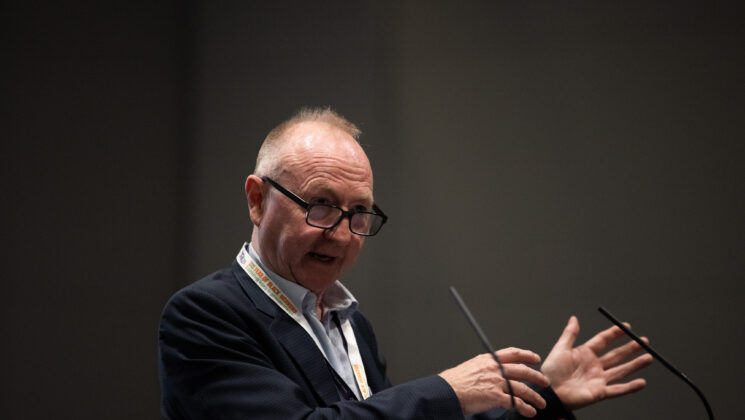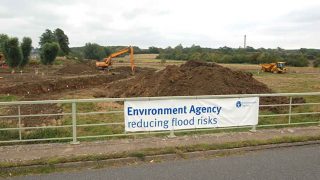UNISON’s annual water, environment and transport (WET) conference met yesterday in Liverpool and opened with a speech from UNISON assistant general secretary Jon Richards (pictured above).
Environment agency pay
He opened by highlighting the situation that the country faced when conference last convened a year ago: “Inflation was ramping up and by the end of the year was at levels we haven’t seen for 40 years. Government borrowing soared and interest rates have climbed since.
“More people pushed into poverty, more hardworking people faced with the choice between eating, paying their mortgages, buying school uniforms for their children or keeping their homes warm.
“And the government’s response? Hold down pay where they were in charge and call for wage restraint across the UK – no mention of holding down excess profits though.
“So, for the first time, members of the Environment Agency went out on strike over pay in January 2023, followed by another day of action in February and action short of strike action since.
“Despite this action and our parliamentary pressure, the government would not engage with us to find a resolution to the dispute. But our members did not back down, they again voted for a second time for industrial action.
Mr Richards went on to note that this action has led to a breakthrough, referencing the recent news of an offer of a £1,500 one off payment for last year.
He continued: “Our EA sector committee has rightly said it will put the offer to members, but has also, understandably, the committee has said it can’t recommend what is a below inflation pay offer.
“But conference, only through action did we and other unions achieve an increase and this sets us up for the forthcoming pay round.”
The topic of Environment Agency pay was also discussed in conference business in a motion that condemned the 2% plus £345 pay offer made by the employer to staff in 2022 and called on the service group executive to intensify the current pay campaign.
Moving the motion, Greg Marshall said agency workers were “hailed as heroes one year, but literally forced to use food banks the next.”
He continued, highlighting that the government’s response to the cost of living crisis was to, in the words of the last EA chief executive to the treasury select committee, “toss workers the crumbs of an unfair, unwise, and unjust pay offer.
“Here he was confirming what we’ve known for ages, that pay in the EA was a ticking time bomb.”
He asked delegates: “who else is going to hold the water industry to account as they dump millions of tons of untreated sewage into our streams, our rivers and our seas? Who else is going to hold big agriculture to account as they dose phosphates over swathes of farmland?
“And who else is going to get up in the middle of the night as the river Severn tops it’s banks and homes and businesses are threatened with inundation?”
“We know who it will be – our members. Our experts, our commitment – that’s why we campaign.”

Water
Elsewhere in his speech, Mr Richards highlighted issues in the water industry, quoting the Guardian’s reporting that, “in 2022, water companies paid shareholders dividends of £1.4bn; up from £540m the previous year”.
He added: “While shareholders celebrated, our workers struggled and services suffered. Lack of investment saw increasing anger by the public at continuing sewage outflows polluting our rivers and seas.”
Sewage being pumped into the UK’s waterways was a key topic for debate, with one motion bemoaning the “ongoing mismanagement of water companies’ finances.”
Adding that the finances of such companies need to be more transparent, it called on the SGE to produce a report to better clarify the financial makeup of water companies which could be used in “lifting the lid on the drain of profits that are disappearing out the back door.”
Another motion called on the SGE to work jointly with the water industry select committee and other stakeholders to pursue a re-nationalisation agenda and bring water back into public ownership, among other things.
One delegate said: “More than ever, water quality is at the forefront of public consciousness.” They noted that Ofwat’s regulatory approach, which prioritises value for money for the consumer, and the water companies adopting risk-based strategies to deliver maximum profits, mean that little money is spent on maintaining infrastructure.
They continued: “Southern Water pleaded guilty to 6,971 illegal sewage discharges between 2010 and 2015 at 17 treatment works in Hampshire, Kent and West Sussex and was fined £90m. These treatment works are obsolete and need replacing”.
Martin Bentley of Cymru/Wales added: “The costs of fines, the costs of infrastructure improvements, get passed on to customers, while the profits get passed on to the shareholder – the shareholder never pays in the privatised model.
“We need to talk about who pays for this work – once again the customer, the workers, the staff are going to be paying for this, and I don’t think that’s right.”

Transport
Mr Richards noted that the Passenger Transport Forum, “who have always mirrored the NJC pay settlements, are seeking to withdraw from pay negotiation, which we continue to resist.”
Further to this, conference debated a motion about the funding of local bus services, which noted the recent government scheme to cap bus fares at £2 in England as part of its support scheme during the cost-of-living crisis, and argued that this incentive doesn’t go far enough to address the challenges working people face.
It called on the executive to actively campaign for government funding of buses in local communities, to work with labour link to lobby for more sustainable bus services to protect members’ jobs and to work with elected mayors to promote efficient transport networks.




